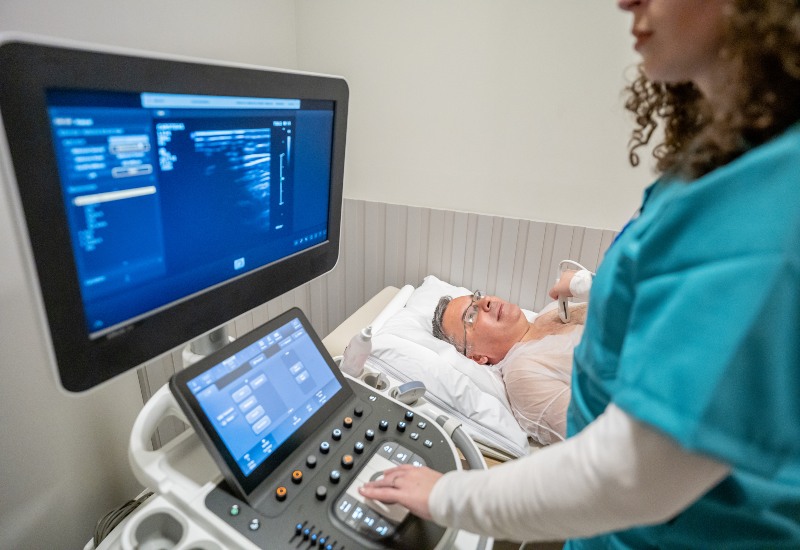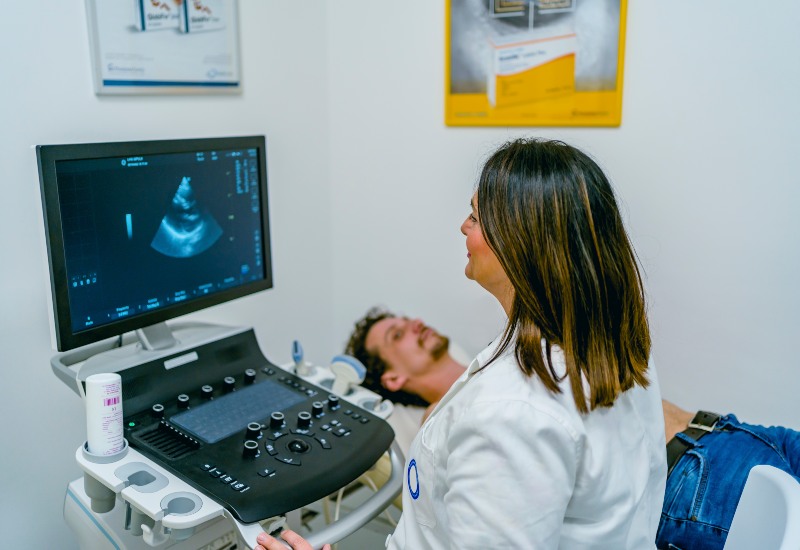How Does an Echocardiogram Differ from an Electrocardiogram?

Comparing Electrocardiogram vs Echocardiogram
Suppose your physician or a cardiologist in New Hampshire suspects that you have a heart condition. In that case, they will want to run diagnostic tests to confirm their belief, identify the area of concern, and design a personalized treatment plan. Two tests that can be used to evaluate the electrical activity of your heart are an electrocardiogram and an echocardiogram. To help you understand when and why one of these tests might be necessary, we’ve created this guide for comparing heart tests. Keep reading to understand the differences between an electrocardiogram vs an echocardiogram better.
What Is an EKG/ECG or Electrocardiogram?
An EKG, ECG, or electrocardiogram, is a cardiac test used to record the electrical activity of your heart. It can help your physician or cardiologist diagnose or monitor heart conditions or plan your treatment. To perform the procedure, your technician will place electrodes on your chest, arms, and legs. These detect the electrical signals of your heart and display them on a monitor for your physician to review. They will check for abnormalities in your heart’s rhythm, electrical impulses, and wave patterns. The test is non-invasive and painless.
Why Do I Need an EKG?
You may need an EKG to diagnose, manage, or treat certain heart conditions. Here are some of the reasons your physician might order this test:
- Diagnose a heart condition like arrhythmia, heart attack, heart failure, or valve disease
- Monitor heart health and the effectiveness of cardiovascular rehabilitation, and track changes over time
- Screen you to understand your risk of cardiovascular disease better
- Evaluate symptoms like shortness of breath, chest pains, fainting, or heart flutters or palpitations
- Assess your heart health and identify risks before surgery
- Evaluate the effects of certain medications on heart health
What Is an Echo or Echocardiogram?
An echocardiogram, also called an echo, is also a non-invasive medical imaging test. Rather than using electrodes, it uses ultrasound technology to create detailed images of the heart. It is used to evaluate the heart’s structure, function, and blood flow. During the procedure, a technician will apply a cool gel to certain areas on your chest and then press a handheld device or wand to these areas. This generates ultrasound waves that bounce off of organs and other structures, creating images.

Why Do I Need an Echo?
Your physician may order an echo to examine your heart, evaluate function, check blood flow, plan or monitor treatment, manage a condition or disease, or diagnose the underlying cause of certain symptoms. Some of the most common reasons for an echo are:
- Diagnosing the cause of symptoms like shortness of breath, chest pain or pressure, arrhythmia, fatigue or weakness, edema, ankle swelling, or a heart murmur
- Obtain detailed information about the structure, function, blood flow, and valves of the heart
- Detect problems like blood clots, fluid around the heart, or tumors
- Diagnose or monitor conditions like heart failure, heart valve disease, cardiomyopathy, endocarditis, heart defects, and heart damage
Differences Between an ECG vs Echo
It’s important to understand the differences between an ECG vs echocardiogram. An ECG or EKG measures your heart’s electrical activity, including its rhythm and rate. An echo is an ultrasound that uses sound waves to create images of the heart’s structure and function. Both are non-invasive and relatively painless; however, an echo takes longer.
Schedule Your ECG or Echo
At Cardiovascular Specialists of New England, we have a team of cardiac specialists and board-certified cardiologists committed to patient care, education, and prevention. We use the latest techniques and technology to diagnose and manage conditions that affect the heart and vascular system. We will carefully explain your tests and procedures to ensure you understand their benefits and necessity, and also explain your results in clear, simple language. Our team wants to empower you to make informed decisions about your health so that we can effectively treat, prevent, or manage conditions and diseases. Call now to schedule an ECG or echo in New Hampshire, or contact us online with questions.
Stay Tuned! More information coming soon!
